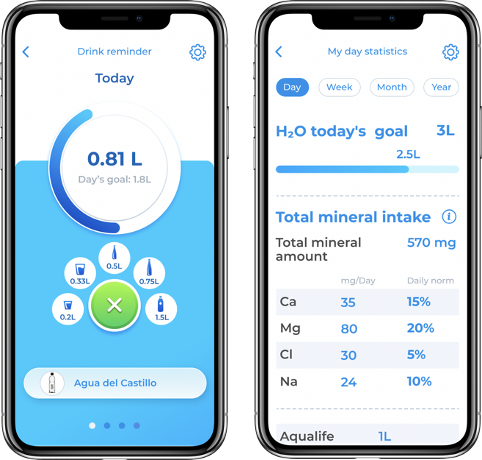
In the water choice app PickAqua, you can find all waters by its dominant element or various other value parameters.


Home » Water stories » Blog » Constipation. Can water solve it?

Yes, it can! It is a question of water mineral composition, temperature, and drinking technique.
Water rich in magnesium (Mg) sulfate (SO4) is a natural remedy for constipation.
In South America, it is quite commonplace to share a feel-good story about how successful the walk to the toilet was. In our part of the world, it is not common to talk about it among family and friends. But given that it is a very important health issue and that a large proportion of the population suffers from constipation, it should certainly be spoken about more loudly. And that’s where water can come in.
Lifestyle factors such as low physical activity, inadequate fiber, and water intake contribute to constipation, significantly affecting a person’s quality of life.
It’s no secret that all our health lives in our stomach. How we feel, look and even think as a whole depends on the cleanliness of our intestinal tract and the proper microbiome within it. You could say that our long-term destiny depends on the health of our abdomen. For example, if the stomach is not working as it should and we are regularly constipated, this certainly has an impact on the metabolic processes and, ultimately, on our mood. Then there are other consequences, which could be described in very broad terms.

As with all health problems, we need to look for the root cause.
If the only cause is insufficient water intake, then, of course, regular and sufficient water intake will be enough. Constipation can therefore occur more easily than we might think. Water is essential for healthy digestion and helps the body absorb nutrients from food. In cooperation with fiber, water helps it to do its job by aiding digestion.
But if the problem of constipation is due to some other cause, you should rule out all other possibilities that contribute to it. Going to the toilet three times a week or less is a sure sign of constipation. To get back on the ceramic throne more often and more confidently, some lifestyle improvements are needed.
One solution is to drink natural mineral water rich in magnesium (Mg) sulfate (SO4).
This category includes waters with at least 1200 mg/l sulfate (SO4).

The mechanism of action of sulfate is well known: sulfate osmotically retains more water in the colon and additionally promotes the excretion of water in the intestine. This increases the liquid content of the stool and makes it softer. The stool volume increases and at the same time, the bowel function is accelerated. Sulfate plays an important role in fat metabolism and liver detoxification. It helps to improve digestion and stimulates bowel and bile activity.
You can find out about the composition of all the water by looking at the magnesium and sulfate content on the PickAqua water choice app. Or visit: www.pickaqua.com



The PickAqua app has a mineral filter for your convenience, so you can easily select the dominant mineral of interest and the app will sort the waters by the mineral of your choice.
A study by scientists at the University of Freiburg has shown that people with constipation can use water containing sulfate (SO4) on a daily basis, which naturally stimulates the bowel and prevents constipation. In addition, sulphate-containing waters are not addictive like many anti-constipation drugs. People who regularly drink mineral waters containing sulfate (SO4) naturally stimulate the bowel and prevent constipation.
For an immediate effect, water with a higher sulfate (SO4) content of at least 3000 mg/l would be needed. The higher the sulfate content of the water, the stronger the effect is expected to be.
Studies have shown positive results in increasing bowel movements and improving stool consistency. Although methodologically complex, the studies highlight the potential of natural mineral waters rich in magnesium sulfate as a natural and safe remedy for constipation.
One of the studies involved 244 women aged between 18 and 60 years, identified by 62 general practitioners across France.
Subjects drank different amounts (0.5L and 1L) of water containing about 1500 mg/l sulfate and 120 mg/l magnesium every day for four weeks.
No significant effect was observed with this magnesium sulfate concentration in week 1.
In week 2, constipation was reduced in 30.9% of the patients who drank 0.5L of the treatment water and in 37.5% of the group who drank 1L of magnesium sulfate water.
Conclusion: the study confirms the efficacy and safety of magnesium sulfate water in the treatment of functional constipation and confirms that it is associated with a response within seven days at magnesium sulfate concentrations of Mg 120mg/l and SO4 1500mg/l.
Other studies using natural mineral waters with higher concentrations of magnesium and sulfate have observed the desired effect much faster. In some cases of very high magnesium sulfate concentrations, constipation has been prevented immediately the same day after two hours by drinking warm water on an empty stomach.

One study on the effectiveness of warm water therapy for constipation found that the temperature of the water is important, as is the composition of the water. Based on this study, drinking warm water regularly before breakfast can be used as an alternative way to overcome constipation. The results showed that the treatment was 68% effective on the first day, 88% on the second day, and 84% on the third day.
During the three days of drinking warm water before breakfast, it was found that 15 subjects (60%) were able to defecate daily, six subjects (24%) defecated twice, three subjects (12%) defecated once and only one subject (4%) could not defecate at all during the three days. In other words, 24 subjects (96%) out of 25 were able to defecate at least once in three days with this method.
The water temperature should be around 40C°. It makes a big difference whether we drink warm or cold water. Warm water travels much further into the intestinal tract and performs its functions more efficiently. Cold water, on the other hand, will be partially delayed in the stomach, warming up to a certain temperature, and only then will it go on to its full extent.
There is also a method where you can drink cold water, which will shock the intestinal tract and cause it to contract, promoting defecation. But this method will certainly not be the healthiest. According to Ayurveda, cold water should be used as little as possible and cold drinks should be avoided during winter.
It is always best to drink water in a sitting position when your stomach is relaxed. It is safe to drink larger amounts of water in the morning and larger sips. At least 0.5 liters of water should be drunk in the morning to kick-start the intestinal tract, perform the function of an internal shower, and replenish water reserves lost during the night. Afterwards, it would be very advisable not to rush to breakfast immediately, but to wait at least an hour. During the day, drinking water in smaller sips is preferable, but more frequently.
These rituals are desirable for all people, including those without problems, but especially for those who visit the ceramic throne less than twice a day.
https://pubmed.ncbi.nlm.nih.gov/31170680/
https://pubmed.ncbi.nlm.nih.gov/24342746/
https://www.ncbi.nlm.nih.gov/pmc/articles/PMC7400933/
https://medaqua.hu/dl/pdf/HJKorh-en.pdf
https://doi.org/10.35974/isc.v7i1.1088
E-ISSN: 2476-9606 Abstract Proceedings International Scholars Conference Volume 7 Issue 1, October 2019, pp.475-482
Comments are closed for this article!